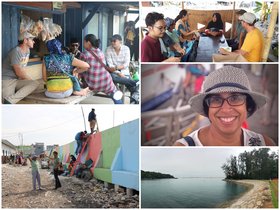Early Career Scientists are awarded Their Own Research Project in the 2nd SPP SeaLevel phase
A great advance of their professional career, the new SPP SeaLevel phase offers the opportunity to two previously postdoc researchers of the program, Dr Rapti Siriwirdane-de Zoysa (ZMT) and Dr Johannes Herbeck (Uni-Bremen), to lead their own research project as PIs during the 2nd phase, named “BlueUrban”. Congratulations to both for their great achievement!
Rapti Siriwardane-de Zoysa is a marine anthropologist with a DPhil from the University of Bonn´s Zentrum für Entwicklungsforchung, and a MSc. in Environmental Politics from the University of Oxford´s School of Geography and the Environment. She is presently a postdoctoral researcher at the Leibniz Centre for Tropical Marine Research in Bremen, where she served as scientific co-ordinator for the SPP 1889 first-phase project EMERSA, co-lead by A-K Hornidge and M Flitner. Given her undergraduate training on the political ecologies of the Malay-Indonesian archipelago at the National University of Singapore, EMERSA brought her ‘back’ to the region. What enriched her ethnographic fieldwork across varied urban environments during this first phase, was the ability to meander between local community-level and policymaking worlds. This multi-sited fieldwork offered her a more nuanced understanding of how communities make sense of material boundaries between surface land, water, atmosphere and tectonics in multiple ways, particularly with regard to how 'sea level change' as a reality comes to be differently framed, politicized, and acted upon by local and regional actors.
The seeming ambivalence between policies and practices of high-value shoreline property development versus hard infrastructural coastal protection (i.e. living with water as opposed to protective living away from water), sparked her interest in co-developing a second phase project with her colleague, human geographer Johannes Herbeck. Their new project, ‘Towards Blue Urbanism for Sea Level Change Adaptation: Global Trajectories and Speculative Futuring in Island Southeast Asia’ (BlueUrban) enables a continuation of their work into the second SPP phase. BlueUrban brings in a stronger infrastructural focus given their interest in two pervasive technological practices for sea level change adaptation – multifunctional ‘super’ dykes and large floating structures (including artificial islands). As an environmental anthropologist, she is particularly interested in how broader utopian/dystopian visions and everyday urban practices remake the futures of coastal metropolises in the decades to come.
Johannes Herbeck has studied human geography, political sciences, and sociology at the Technical University of Munich and the Ludwig-Maximilians-University in Munich, Germany. Since 2008, he has been working as researcher at the Sustainability Research Centre at the University of Bremen, Germany. In 2014, he was awarded a PhD for his thesis Geographies of Climate Change: Vulnerability, security, translocality. Since then, he has been a researcher and scientific coordinator in different projects and has carried out research in West Africa and Southeast Asia. Most recently, at the project EMERSA, he has mainly investigated the mobility of policies for coastal protection and sea level rise adaptation in and between mega cities in Southeast Asia.
Given his strong interest in political ecology, policy mobilities, as well as coastal adaptation, he is enthusiastically looking forward to the 2nd funding phase of SPP and his work in the BlueUrban project He is especially interested in understanding the global connectedness of innovations for sea level rise adaptation and to analyze the networks and modes of translations that constitute the circulation of new ideas and technologies of coastal protection.

